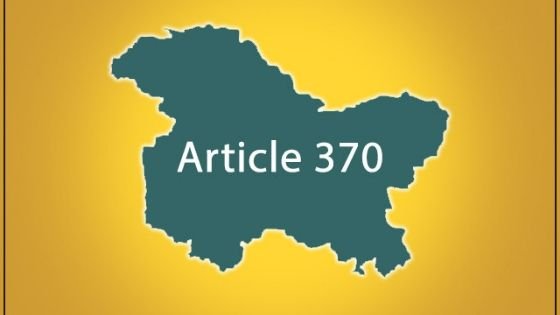Article 370 Kashmir
ARTICLE 370 Kashmir
INTRODUCTION
The state of Jammu & Kashmir has been given a special autonomous status under Article 370.The part XXI of the Constitution of India, which deals with ‘Temporary, Transitional and special provisions grants this special status to Jammu & Kashmir.

The intent behind the introduction of this article is to give space to the state from both the countries fighting for it.
This article is a measure of safeguard that allows Jammu & Kashmir to have its own constitution. Some issues lie with the Indian Government while others are dealt with by the State Government.
For example, except for defence, foreign affairs, finance and communications, the Indian Parliament needs the State Legislature approval for applying the other laws relating to citizenship, ownership of property, and the fundamental rights, as compared to other Indians.
QUOTE
“The government of India and the government of Jammu and Kashmir are determined to ensure that every Kashmiri lives with dignity having equal rights and equal opportunities” -Pranab Mukherjee
“For 14 years no PM had gone to Jammu and Kashmir. Atal ji changed that and went to Jammu and Kashmir. He gave 3 Mantras- Insaniyat, Jamhuriat and Kashmiriyat (Humanity, democracy and J&K). We aspire to walk on that path” – Narendra Modi
“Some kind of settlement in Kashmir is crucial for both India and Pakistan. It’s also tearing India apart with horrible atrocities in the region which is controlled by Indian armed forces. This is feeding right back into society even in the domain of elementary civil rights.” – Noam Chomsky
“I think there is a misunderstanding about Indians’ traditional views. India did send army into Goa, India did send an army into and fought a war in Kashmir in 1948; India did get Hyderabad by force… I think the narrow projection on the international… arena distorted India’s image.” – Subramanian Swamy
“We must learn from history, there is no military solution for the Kashmir issue…we have to understand this reality.” – Pervez Musharraf
STATISTICS – What Numbers have to Say?
- On 15 August 1947, India and Pakistan were granted independence from the British rule to exist as independent nations. The state of Jammu and Kashmir had opted to neither join India or Pakistan, but to exist as an independent.
- On 20 October 1947, Pakistan army attacked the frontiers of the state and marched towards Srinagar supported by Azad Kashmir Forces, gathering more local support along the way, as the state, at the time had 75% Muslim population.
- Maharaja Hari Singh, the ruler of Jammu & Kashmir, approached India for help. India sent its troops to halt the move of the Azad Kashmir Forces, with the condition that state of Jammu & Kashmir would agree to India. Hence an ‘Instrument of Accession’ was signed between PM Pandit Jawaharlal Nehru and Maharaja Hari Singh on 26 October 1947.
- The troops of the Azad Kashmir Forces repelled back to the line, Line of Control (LOC). Hence, the area of Jammu & Kashmir is still owned by Pakistan which is called Pakistan Occupied Kashmir (POK). Similarly, the area of Jammu & Kashmir held with India is called by Pakistan as India Occupied Kashmir.
- The conflict in 1948 between India and Pakistan made India to take the issue to the United Nations for the resolution. The UN Resolution of 05 January 1949 stated a fair and impartial decision that demilitarized the area of the state from Pakistan and the Indian army as well and the entire decision lied with the people of Jammu and Kashmir.
- On 17 October 1949, Indian constitution adopted Article 370.
DESCRIPTION – Let’s take a Deep Dive
Article 370 provisions:
Except for Defense, Foreign Affairs Finance and Communications, the Indian Government needs the State Government’s approval to apply all other laws.
The central govt. has no power to impose a financial emergency in the state. An emergency can only be imposed on the grounds of internal disturbances and imminent danger from a foreign enemy.
Therefore, the state government has control on how it needs to govern the state without worrying about the central government’s consent.
Indian nationals belonging to other states cannot buy land or property in the state of Jammu and Kashmir.
In India, the Union Government has the residuary powers but in case of Jammu and Kashmir, the residuary powers are with the state government.
People of Jammu and Kashmir hold dual citizenship. People from the rest of India cannot get citizenship of Jammu and Kashmir.
Women who marry a person belonging to any other state loses her right to ownership, however, this is a contentious matter.
SHOULD ARTICLE 370 BE REMOVED?
ADVANTAGES OF SECTION 370
- Jammu and Kashmir have a special power.
- As per this article, an outsider can’t buy land or property in Jammu and Kashmir so this makes the price of real estate under control.
- It’s difficult for an outsider to set up business in Kashmir, so the citizens get an advantage as there are less competition and more opportunities.
- Article 370 maintains inland quality because the state is not filled with people from a different state.
- There is no population explosion as it happens in cities like Delhi, Mumbai, Bangalore etc.
- Less pollution as there are not many industries.
- Local brands are still running.
- This article preserves the identity and culture of the people.
- Less competition for students of Jammu and Kashmir as no other state’s students come to compete in state medical and engineering exams.
- Article 370 is a boon for Kashmir separatist.
DISADVANTAGES OF SECTION 370
- This Article de-links Jammu and Kashmir from the mainstream of India. This is the reason for Non-development in Jammu and Kashmir.
- No feeling of being Indians’ among the people.
- The state is deprived of industrial development as the article doesn’t allow outside investment.
- The youth are deprived of employment and hampers their development.
- Corruption is more in Jammu and Kashmir than from other states.
- Low GDP.
- Many Anti-national elements are active in Jammu and Kashmir and they received shelter under article 370.
- Dr Ambedkar has cautioned Nehru on the plea that it can create difficulties in the full integration of the state with India. This Article would sow the seeds of separatism in the Valley.
- According to Dr Babu Ram Chauhan, an expert on International law, the Indian Constitution can scrap this article even without the approval of the state assembly.
CONCLUSION
Article 370 is an internal arrangement which says how the relations between India and Jammu and Kashmir would be governed. Keeping the internal disturbances of Jammu and Kashmir in mind, we should avoid any action which could worsen the situation. To bring the state in complete normalcy we need to treat the state and its citizens uniformly and it is to be done in a very skilful, smooth and consistent manner.
Author – Riddhi Pansare
Must Explore



